The Security and Privacy Lab is looking for an hourly-paid Research Assistant. The student will work on IoT security, mobile security, or cloud computing security.
The student is expected to be:
- 1) Eager to solve problems
- 2) Familiar with operating systems
- 3) Familiar with system programming (C is preferred)
If you are interested, please send your resume to Professor Bo Chen (bchen@mtu.edu), Assistant Professor, Department of Computer Science.
Dr. Chen’s website: https://cs.mtu.edu/~bchen
SnP Lab website: https://snp.cs.mtu.edu
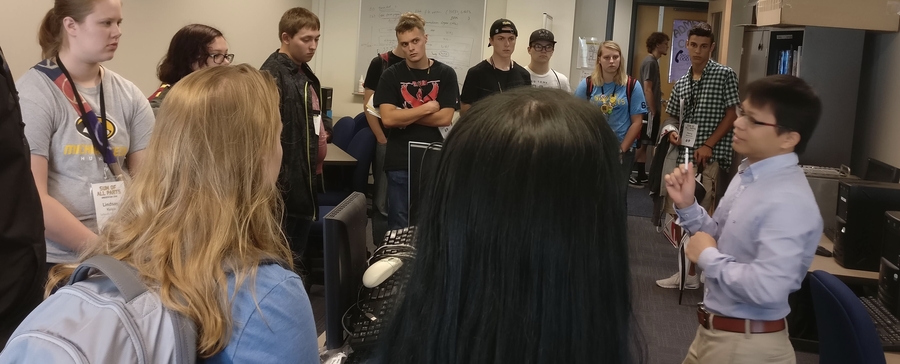
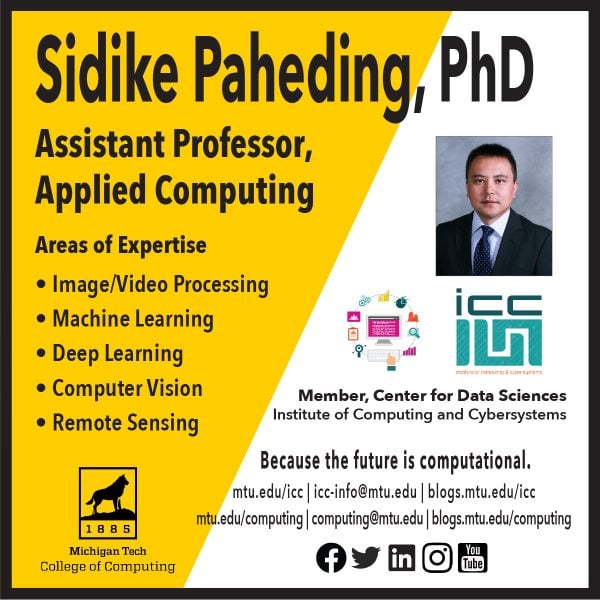
Dr. Sidike Paheding, assistant professor of Applied Computing, is the co-author of a paper published June 3, 2021, the journal “IEEE Access.” The paper is titled, “U-net and its variants for medical image segmentation: A review of theory and applications.”
The paper discusses U-net, an image segmentation technique developed primarily for image segmentation tasks.
The co-authors of the paper are Nahian Siddique, Colin P. Elkin, and Vijay Devabhaktuni, all with the Department of Electrical and Computer Engineering, Purdue University Northwest, Hammond, Indiana.
Abstract
U-net is an image segmentation technique developed primarily for image segmentation tasks. These traits provide U-net with a high utility within the medical imaging community and have resulted in extensive adoption of U-net as the primary tool for segmentation tasks in medical imaging. The success of U-net is evident in its widespread use in nearly all major image modalities, from CT scans and MRI to Xrays and microscopy. Furthermore, while U-net is largely a segmentation tool, there have been instances of the use of U-net in other applications. Given that U-net’s potential is still increasing, this narrative literature review examines the numerous developments and breakthroughs in the U-net architecture and provides observations on recent trends. We also discuss the many innovations that have advanced in deep learning and discuss how these tools facilitate U-net. In addition, we review the different image modalities and application areas that have been enhanced by U-net.
The paper can be accessed on the IEEE Access website.
IEEE Access is a multidisciplinary, applications-oriented, all-electronic archival journal that continuously presents the results of original research or development across all of IEEE’s fields of interest. Supported by article processing charges, its hallmarks are a rapid peer review and publication process with open access to all readers.
Applied Computing: Class of 2021 Special Recognition
Link to the Computer Science Special Recognition awards.
Heather Harris: Outstanding Graduating Senior

Heather has been an outstanding student ever since she has started at Michigan Tech. She was punctual, rarely missed a class, was a very active participant in class, and never missed an assignment in her EET courses. She also played a major role in the EET Senior Design swingset project. She spent a lot of time on developing the swing and addressing all the comments that were received regarding safety of the final product.
Charles Warren: Outstanding Graduating Senior
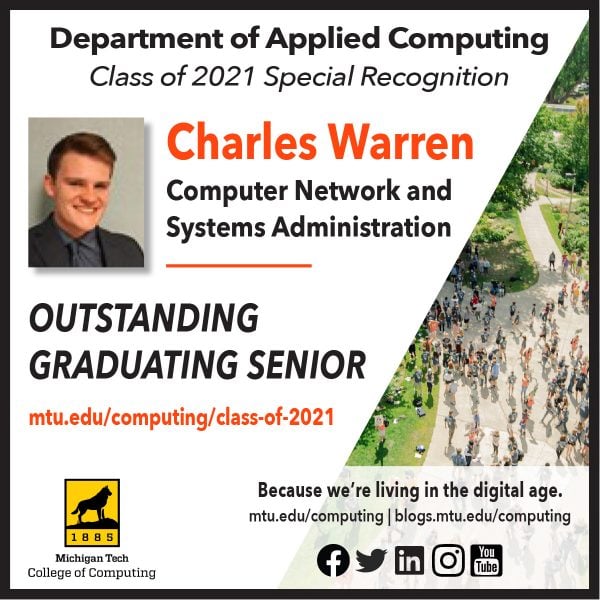
Charles was an undergraduate studying Computer Network and System Administration and a graduate student pursuing an MS in Cybersecurity. He graduated with a cumulative GPA of 3.90 and a departmental GPA of 4.0.
During his time at Michigan Tech he co-founded a student organization that focused on student-led instruction and research in networking and computing topics. It has grown into an undergraduate, graduate, and alumni organization focused on providing cloud and education services at low to no cost as a Non-profit Organization.
Charles has also been an instructor with Dr. Guy Hembroff’s State of Michigan’s Career Technical Education (CTE) funding (2018-2021), which provides local high-school students a cybersecurity curriculum at Michigan Tech.
He is currently working in Palo Alto as a Resident Engineer for security automation. He is a lifelong learner who is always looking to push the boundaries of his industry and to further his own and others’ understanding of topics in computing. His research interests include: cybersecurity, secure design, network security, public key infrastructure (PKI), and Internet of Things (IoT).
Joseph Barbercheck: Outstanding Undergraduate Teaching Assistant

Joe has been a trustworthy and responsible teaching assistant. He has been extremely flexible and has tried his best to help everyone even outside of the scheduled lab times. If a student or a faculty needed extra help, he volunteered his time to make things work.
Besides being an excellent teaching assistant, he also took good care of equipment in the lab and performed routine maintenance tasks such as changing fuses, ordering parts, and stocking the lab with all the necessary components.
Stuart Hoxie: Outstanding Undergraduate Teaching Assistant
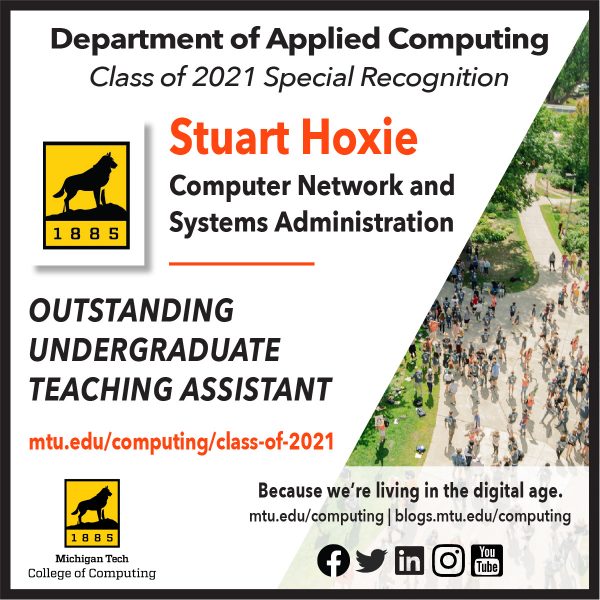
Stuart provided teaching and lab assistance during the Spring 2021 semester for our CNSA and Cybersecurity students in three classes: Microsoft System Administration, Scripting for Automation, Administration, and Security, and Cybersecurity II.
While Stuart has already proven to be a valuable team member working in groups, the Spring semester was his time to exhibit his strong work ethic while operating independently to assist students with both classroom and laboratory questions and issues.
The semester was challenging dealing with COVID and remote work, but Stuart took it in stride – remotely assisting students using the virtual cluster for labs, managing emails and the Canvas course sites, making himself available by attending Zoom meetings, all while reviewing and grading student submissions.
Stuart turned a challenging situation into one of the best semesters for both students and faculty.
by Allison Mills, University Marketing and Communications

A major challenge for fully autonomous vehicles is navigating bad weather. Snow especially confounds crucial sensor data that helps a vehicle gauge depth, find obstacles and keep on the correct side of the yellow line, assuming it is visible. Averaging more than 200 inches of snow every winter, Michigan’s Keweenaw Peninsula is the perfect place to push autonomous vehicle tech to its limits.
In two papers presented at SPIE Defense + Commercial Sensing 2021, researchers from Michigan Technological University discuss solutions for snowy driving scenarios that could help bring self-driving options to snowy cities like Chicago, Detroit, Minneapolis and Toronto.
The team includes Nathir Rawashdeh and doctoral student Abu-Alrub (CC) as well as Jeremy Bos and student researchers Akhil Kurup, Derek Chopp and Zach Jeffries (ECE).
Read more about their collaborative mobility research on mtu.edu/news.
This MTU news story was published by Science Daily, TechXplore, Knowridge Science Report and other research news aggregators.
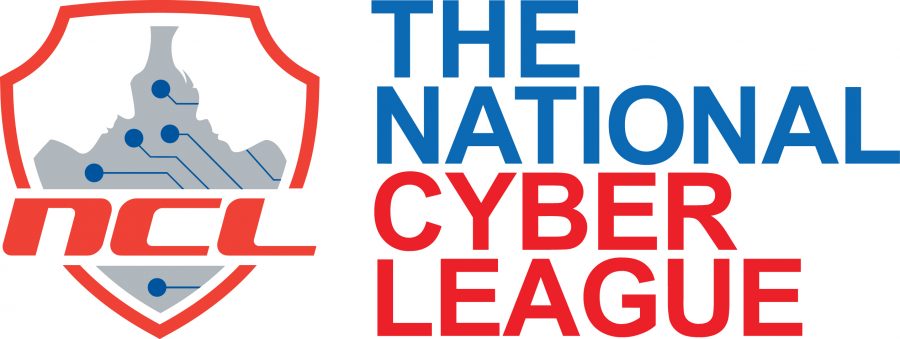
Michigan Tech ranks number three (3) in the Spring 2021 National Cyber League’s Cyber Power Rankings, rising 12 points from a Fall 2020 ranking of 15. One hundred (100) teams were ranked.
In the NCL cyber-competitions, thousands of students from hundreds of colleges and universities nationwide are challenged to identify hackers from forensic data, pentest and audit vulnerable websites, recover from ransomware attacks, and more.

Three factors are considered in a school’s annual Cyber Power Ranking. In descending magnitude of weight, they are:
- The school’s top performing team during the Team Game
- The school’s top performing student during the Individual Game
- The number of participating students from the school, with additional consideration given to better student performance during the Individual Game
Schools are ranked based on their top team performance, their top student’s individual performance, and the aggregate individual performance of their students. The rankings represent the ability of students from these schools to perform real-world cybersecurity tasks on the Cyber Skyline platform.
See how the NCL competitions work.
View the full list of NCL rankings.
The Cyber Power Rankings were created by Cyber Skyline in partnership with the National Cyber League (NCL). Every year, over 10,000 students from more than 300 colleges and universities across the US participate in the NCL competitions.

Apply now for Michigan Tech’s 2021-22 cohort of Cybersecurity Scholars and jumpstart your cybersecurity career!
The deadline to apply is June 1, 2021.
This generous scholarship opportunity provides up to three years of tuition and annual stipend.
Then, following completion of your degree, you’ll work in a cybersecurity-related position for a federal, state, local, or tribal agency for up to three years– a period equal to the length of your scholarship.
See full guidelines, requirements, and application information on the SFS website: mtu.edu/sfs.
Eligible Degree Programs
- BS in Cybersecurity (CyS)
- BS in Computer Network and System Administration (CNSA)
- BS in Computer Science (CS)
- BS in Software Engineering (SE)
- BS in Computer Engineering (CpE)
- BS in Electrical Engineering (EE)
- BS in Management Information Systems (MIS)
- MS in Cybersecurity
Ready to apply? Visit mtu.edu/sfs
Questions? Email sfs@mtu.edu
Or Contact: Project PI Profesor Yu Cai, or any key faculty member: Professor Jean Mayo, Professor Todd O. Arney, Professor Bo Chen, Professor Chee-Wooi Ten, Professor Kedmon N. Hungwe, and Dr. Laura Kasson Fiss.
The Michigan Tech SFS Program
The SFS program at Michigan Tech involves multiple programs and departments, including the College of Computing and its departments of Applied Computing and Computer Science; the College of Engineering’s Department of Electrical and Computer Engineering; and the College of Business’s Management Information Systems B.S. program.
“The U.S. is facing a significant shortage of well-trained and well-prepared cybersecurity professionals,” said Dr. Yu Cai, professor of applied computing and the principal investigator of the grant. “This new scholarship will continue to develop Michigan Tech’s national and international reputation as a leader and innovator in cybersecurity education, research and outreach activities.”
The five-year, $3.3 million NSF grant provides up to three years of full scholarship support for 20 Michigan Tech undergraduate and graduate students.
About the NSF Scholarship
Protecting worldwide digital infrastructure has become an urgent focus of industry and government. And employment in this sector is expected to grow exponentially in the coming years.
In response, the National Science Foundation CyberCorps: Scholarship for Service (SFS) program was introduced as a nationwide program to recruit and train the next generation of information technology professionals, industrial control system security professionals, and security managers.

Apply now for Michigan Tech’s 2021-22 cohort of Cybersecurity Scholars and jumpstart your cybersecurity career!
The deadline to apply is June 1, 2021.
This generous scholarship opportunity provides up to three years of tuition and annual stipend.
Then, following completion of your degree, you’ll work in a cybersecurity-related position for a federal, state, local, or tribal agency for up to three years– a period equal to the length of your scholarship.
See full guidelines, requirements, and application information on the SFS website: mtu.edu/sfs.
Eligible Degree Programs
- BS in Cybersecurity (CyS)
- BS in Computer Network and System Administration (CNSA)
- BS in Computer Science (CS)
- BS in Software Engineering (SE)
- BS in Computer Engineering (CpE)
- BS in Electrical Engineering (EE)
- BS in Management Information Systems (MIS)
- MS in Cybersecurity
Ready to apply? Visit mtu.edu/sfs
Questions? Email sfs@mtu.edu
Or Contact: Project PI Profesor Yu Cai, or any key faculty member: Professor Jean Mayo, Professor Todd O. Arney, Professor Bo Chen, Professor Chee-Wooi Ten, Professor Kedmon N. Hungwe, and Dr. Laura Kasson Fiss.
The Michigan Tech SFS Program
The SFS program at Michigan Tech involves multiple programs and departments, including the College of Computing and its departments of Applied Computing and Computer Science; the College of Engineering’s Department of Electrical and Computer Engineering; and the College of Business’s Management Information Systems B.S. program.
“The U.S. is facing a significant shortage of well-trained and well-prepared cybersecurity professionals,” said Dr. Yu Cai, professor of applied computing and the principal investigator of the grant. “This new scholarship will continue to develop Michigan Tech’s national and international reputation as a leader and innovator in cybersecurity education, research and outreach activities.”
The five-year, $3.3 million NSF grant provides up to three years of full scholarship support for 20 Michigan Tech undergraduate and graduate students.
About the NSF Scholarship
Protecting worldwide digital infrastructure has become an urgent focus of industry and government. And employment in this sector is expected to grow exponentially in the coming years.
In response, the National Science Foundation CyberCorps: Scholarship for Service (SFS) program was introduced as a nationwide program to recruit and train the next generation of information technology professionals, industrial control system security professionals, and security managers.